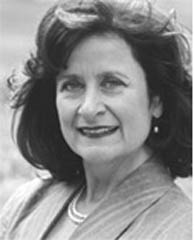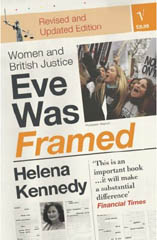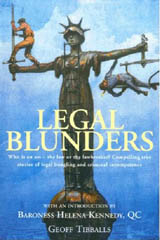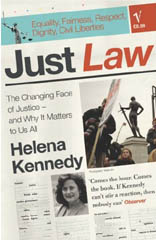Just Law
 As an outspoken barrister, through television and newspapers, and now in your book, you have been ready to challenge weaknesses in the legal system. How did writing Even Was Framed challenge you?
As an outspoken barrister, through television and newspapers, and now in your book, you have been ready to challenge weaknesses in the legal system. How did writing Even Was Framed challenge you?
One of the challenges for me in writing a book on the law was to write it in an accessible way. So often attempts to deal with the law are covered with obfuscation. The austere language of the law is so off-putting to the general public. I don’t think it has to be like that. You can talk about the law in a way that actually does engage the public’s interest and attention, and doesn’t mystify the law and make it something that is only understood by a certain group of people. One reason that lawyers might use that sort of distancing language is to keep other people out. This is, of course, done by other specialist groups too. But the law is essentially about social relationships, and people have to be able to take part in that debate. And so, in Eve Was Framed, I sought to deal with quite difficult subjects using language that was not exclusive. I wanted this book to reach not only the wider public, but also those who are involved in the law itself, and those who might be influential in challenging the law, and I think it has been reasonably successful in doing that.
If you really want your book to stimulate debate within the largely male legal profession, by concentrating on women’s experience aren’t you running the risk that Eve Was Framed will be written off as a feminist tract?
I don’t think it could be written off in that way, it’s not that kind of book. It’s almost like a speech to the jury, where you have to be sensitive to the very many different ways in which people come to a subject like the law and the way in which different kinds of cases are handled.
Discussing the protection of liberty, you say that concerns about the way in which a victim is treated have to be balanced with concerns about the way in which the defendants are tried.
The balancing act is a very important one, and it is within this tension between the interests of victims and defendants that justice is declared. I’m conscious not only of the issues attached to the treatment of victims in our courtrooms, but also of the importance of protecting defendant’s rights, and I tried to write Eve Was Framed so that readers become the jury and can draw their own conclusions. I tried to step back from saying ‘and this is what you ought to think’. People can reach the bottom line without that much help. I wanted to leave decisions to be made by those who are reading, having had the evidence presented to them. But, in writing the book, as in a speech to the jury, there have to be highs and lows, light as well as dark, the flow has to change. When you’re writing something that is essentially polemic, wanting to create change, it is very easy to have only one tone and for a finger to be wagging in there somewhere. I tried to ensure that there was no wagging finger, and I think you’ll find that there isn’t one.
 Reading your book made me look at some of my own values and attitudes which I hadn’t considered with any detachment before.
Reading your book made me look at some of my own values and attitudes which I hadn’t considered with any detachment before.
Having written a book about women’s experiences with the law, the assumption is that I must spend my time representing women, when, in fact, the vast majority of my clients are men because of the nature of my work – women tend not to commit serious crime. I used the experience of women as a paradigm for some of the failings of the law. I think there is a great sense amongst the general public that somehow something is wrong with the legal system. These failings, which in Eve Was Framed, I look at from the point of view of women, could equally be viewed from experience of other people in our society who do not feel that their voice is heard within the law. I suppose the criticism that many working class people would have of the law is that it doesn’t often take account of their circumstances, that there is a failure of understanding of how ordinary people live by many of those administer the law. Black people, too, may have a sense of that failing. I think that there are growing numbers of people who feel that the law is failing them. That is alarming. Such generalised lack of confidence means we really are facing serious problems, because the law is at the heart of our democracy. We have to address these problems. I my book I highlight ways in which the law fails women and then ask, what does this say about the legal system as whole?
By fuelling this debate, aren’t you yourself undermining public confidence in the legal system for the sake of rocking the boat?
I love the law! It really is the heart of my professional life. I have often had forays into other areas, like broadcasting and writing, and at times I’ve been seduced into projecting the possibility of doing something other than practising law. But I can’t leave the law, because I care about it so much and because I think it is so important. Writing about it, shaking this boat, is not about shaking something which is totally sound and is working perfectly well. It’s about making sure that the law does keep abreast of social change. That isn’t about following fashion, law can’t be subject to fashion, but if it drags behind the changes that take place in society, then it will fail people, and I think that is happening at the moment. That’s why we need a much broader sort of judiciary, and, among other things, many more women involved in it. We need different ways of appointing our judges, better training for them. Our world is more complex, and our public more demanding. So they should be, because we are better educated now than we ever have been. There is less deference in our society and that’s a good thing, but it does put a lot of weight on the shoulders of those in public office.
Are you saying that you think the principles of the law should be continually adjusted to reflect social trends?
The law can’t reflect every social change, or it would find itself doing a lot of things at the behest of tabloid editors. Principles of justice and fairness must always be fundamental, along with sensitivity to changes in society. There has to be constant renewal within the law, it’s not static. The law works effectively because the practitioners breathe life into it. Times come when the breath is frail, and other times the breath is strong.
For me, Boswell’s London Journal 1762-1763 gives a graphic indication of how far social attitudes can change. Boswell was in his early twenties when he wrote it, and he’s pretty frank about his sexual adventures. As I remember it, at one point, he’s just spent the night with two girls he reckons must be under fourteen, and who, probably because they were so young, were happy to accept a mere bottle of sherry as payment. He seems to have very different responses to women according to their ‘social station’, and whether they are ‘respectable’ or not.
In more openly addressing the taboo of child sex abuse, we have recently seen values shifting considerably. But change isn’t all in one direction. For instance, the cultural vilification of single parents seems to me to be a backslide because, once you start stigmatising single-parenthood, fewer and fewer women will make the step of leaving abusive relationships.
 Looking back to your girlhood in Glasgow, do you think that your early reading influenced the development of your strong personal sense of justice and injustice, and your interest in the law as a professions?
Looking back to your girlhood in Glasgow, do you think that your early reading influenced the development of your strong personal sense of justice and injustice, and your interest in the law as a professions?
I was brought up on the traditional fodder of the Scottish schoolchild, Robert Louis Stevenson, Scott and so on. I loved Grassic Gibbon’s Scots Quair. In general terms, I think that Scottish people are not particularly given to deference, and that we have quite a strong sense of justice. Scots are inclined to empathise with those who are subjected to oppression. Consequently, Scottish writing often deals with unfairness and ways in which people experience discrimination, although it’s not often put so badly.
How do you feel about women writers interpreting the world through a man’s eyes, or the other way around?
I think it’s fine, we can all explore those things, though some people will have a greater facility for it than others. When it comes to empathising, it might be easier for people of the same sex to do it, but that’s not necessarily the case. For example, there’s an ongoing argument about what women judges would really bring to the law, would they make a difference? Research done in the United States found that on the whole, women didn’t judge any differently from men – perhaps because the training means that we actually end up seeing things from a male perspective – but that women did tend to become the guardians of women’s issues.
There certainly should be more women judges. Yet sometimes women are harder even on their own sex than men might be. I would hate a situation where it was only women who tried rape cases and so on. I would say in terms of literature, that some people will feel inhibited and others will not feel inhibited about dealing with characters of the opposite sex. So much depends on the individual writer. I don’t think you can be prescriptive.
What about the treatment of law and crime in fiction?
I book is spoiled for me if I know something couldn’t possibly happen. I’m not pedantic about it, I’m not looking for minute errors, but I do get irritated when something crass is done, like the extraordinary business of barristers going up and banging the witness box in front of their witness, when in fact in Britain such a thing could never possibly happen. Some British authors have watched too many American television courtroom dramas.
On the other hand, David Hare has written a wonderful play called Murmuring Judges ‘Murmuring Judges’ is a specifically Scottish thin. In days gone by, to ‘murmur a judge’ meant to criticise a judge and if you went around saying rude things about judges it was a criminal offence, because it was bringing the law into disrepute, and under-mining confidence. I’m sure I would have been described as a judge murmurer.
Through the dialogue of Murmering Judges David Hare discloses hidden prejudices that exist within the law. He introduces the character of a young woman lawyer, who is black, to bring a different set of eyes to see how the legal system works. She is shocked at what she sees, not so much the callousness as the casualness with which people’s lives are dealt with within the law. A very interesting play.
I do. I have a very extensive library of law books, not on what people would call pure law, but on subjects related to law, criminology and sociology, research into the penal system and so on. I have a really massive library of that kind of material, which I can turn to make my assertions well founded when I write about the law. I have a wonderful collection of books from the series Notable British Trials. At first I was mainly looking for accounts of women’s trials, and I got some book dealers to look out for them for me. Now I’ve extended it – I find the whole series fascinating.
Does the history of witchcraft trials form part of your collection?
Yes. The witchcraft trials are pretty well documented. In the early days cases were tried by the ecclesiastical courts before they were moved into what was the King’s Bench. it seems that women who didn’t conform ran the risk of being characterised as witches. Many of them were healers and midwives. As such they were actually challenging patriarchal power, and that was why they were marginalised. Women who chose to live independent lives were ‘beyond the pale’, and were often tried as witches. The way in which trials took place was extraordinary. You were thrown into the briny and if you sank you were innocent, if you floated you were guilty, so there was really no winning. We are still emerging from a time when society penalises women who don’t conform. The demonising of ‘inappropriate’ women is still going on.
It’s easy to forget how recently women were barred even from graduating from universities in this country… you mention Sophie Jex-Blake in your book.
In the 1880s Sophie Jex-Blake was refused entry to Edinburgh University to study medicine on the grounds that she was a woman. She then challenged this decision in the courts, and lost. The judge supported the attitude that to study medicine would take her away from those activities women were naturally intended for, nurturing within the family and so on. His judgement followed the same spurious reasoning and reference to precedence that was given to try and keep women out of the ministry in the Church of England.
What do you think about the view, ‘women have the real power’?
The idea that ‘behind very great man, there is a great woman’, and these women quietly rule the world? Measuring women’s power as being the ‘quiet power’ hasn’t been satisfying to women, and we won’t settle for it any longer,
©Jennie Renton 1993
From the Scottish Book Collector archives
Helena Kennedy’s latest book, Just Law: The Changing Face of Justice – and why it matter to us, describes in shocking detail the current retreat from the rule of law and civil liberties, both of which are being subverted for short-term gains.
For more information on Helena Kennedy visit her website: www.helenakennedy.co.uk


Comments